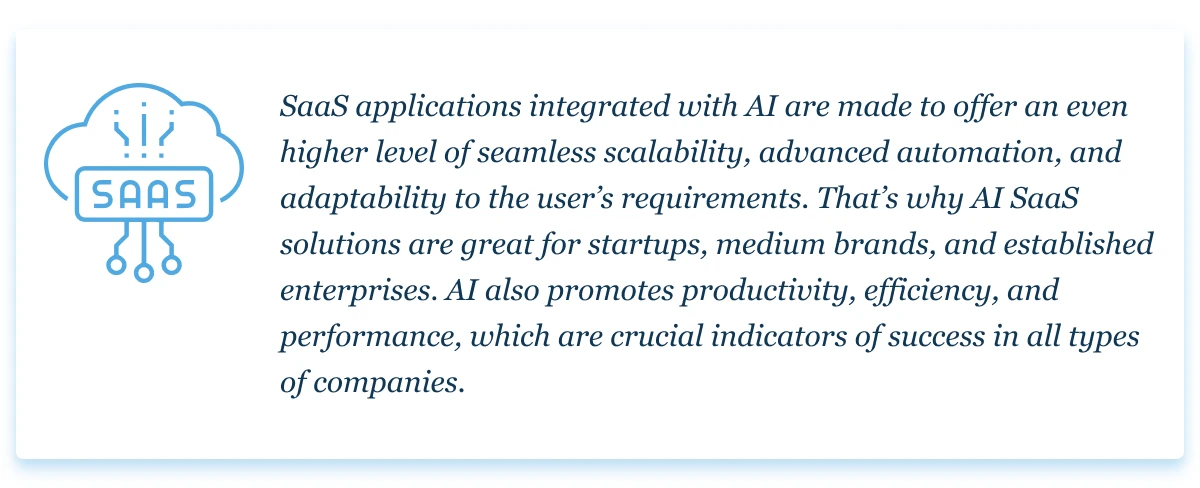The technological landscape is rapidly evolving, and the integration of artificial intelligence has become a crucial force driving innovation across industries. AI in SaaS is one of the biggest pivots that can be observed at the moment. The transformative shift has redefined industry standards and reshaped the operations of companies that offer Software as a Service. In this article, we want to take a closer look at how AI affects SaaS businesses and find out what can be expected in the future.
What is software as a service?
SaaS is a business model for delivering software applications via the Internet. It’s a popular, cloud-based alternative to traditional apps, where programs are downloaded and installed on individual computers or servers. SaaS is usually accessed via a subscription model that allows the user to enter the app via a web browser. This approach eliminates the need for finding installation files, going through the process, providing updates, and maintaining the software by an individual.
All processing is happening in the cloud, where data is stored as well. Software as a Service means that the responsibility for infrastructure updates, maintenance, and security belongs to the provider. The user can focus on the app’s capabilities instead of managing technical issues. SaaS solutions are usually highly scalable, which means their subscription plans and additional features are adjusted to the evolving needs of their customers.

Source: Unsplash
What are the main benefits of SaaS?
Software as a Service gained popularity so quickly across various industries due to a plethora of advantages it offers:
- Cost efficiency: The cost of using a SaaS solution is lower than developing a custom system.
- Scalability: SaaS business models are designed to grow with their customers, offering more features and capacity.
- Accessibility: All that is required to use a SaaS app is the internet connection and a web browser.
- Flexibility: Usually, SaaS providers offer several work arrangements to adjust their products to numerous client groups.
- Automated updates: Every new version of the system is delivered by the brand, so the user is not even aware of an update.
- Maintenance: To minimize downtime and maximize efficiency, SaaS companies handle maintenance on their own.
- Enhanced collaboration: SaaS applications are made for real-time collaboration and seamless teamwork, even when their users are not in the same location.
- Advanced security: Established vendors use robust safety protocols and data encryption to ensure the highest level of data protection.
- Business intelligence: SaaS products often have built-in data analytics features for report generation and insight-based decision-making.
- AI readiness: SaaS creators want to future-proof their solutions and make them ready for technological advancements. AI for SaaS enables sophisticated functionalities not available before.
SaaS and artificial intelligence – How do they work together?
Software as a Service is already one of the most transformative solutions on the market. When boosted by the transformative power of AI, it can be enhanced to offer new capabilities and opportunities. For example, AI can positively influence customer experience by automating client support, providing personalization, helping providers with routine maintenance tasks, and reducing workload in departments that can’t handle the magnitude of daily duties.
 AI and SaaS catalyze innovation. SaaS companies are now able to develop solutions that were previously impossible to create. For example, predictive analytics powered by AI can provide businesses with detailed insights into future trends, customer behavior, well-executed strategies, and areas to improve. This way, they can make informed decisions and grow their organizations in much more sufficient and sustainable ways.
AI and SaaS catalyze innovation. SaaS companies are now able to develop solutions that were previously impossible to create. For example, predictive analytics powered by AI can provide businesses with detailed insights into future trends, customer behavior, well-executed strategies, and areas to improve. This way, they can make informed decisions and grow their organizations in much more sufficient and sustainable ways.
There are countless new possibilities available for AI-based SaaS. Another one is the empowerment of software development processes. AI models can quickly learn and adapt to evolving user needs, which allows IT brands to prepare apps, websites, and other digital products that are more accessible, intuitive, and interactive. Seamless customer experience available 24/7, as well as high levels of personalization, are some of the most sought-after benefits within the industry.
The impact of AI on SaaS companies
Let’s explore how SaaS businesses already use artificial intelligence to their advantage. It’s important to underline how AI can influence internal operations, as well as the solutions such companies offer to their clients.
Enhanced efficiency and productivity
AI tools are leveraged by SaaS companies to streamline their workflows. Time-consuming, manual tasks can be automated to achieve much better results. For example, AI-powered big data analytics are used to eliminate human error and quickly get desired conclusions or predictions. Gained back efficiency allows IT teams to focus on strategic projects, leading to increased productivity.

Source: Unsplash
Personalized user experiences
AI and machine learning prove themselves useful for customer-centric businesses. Algorithms analyze vast amounts of data to understand user behaviors and preferences. Then, they deliver individual recommendations. SaaS platforms can take advantage of these capabilities to offer personalized experiences to their customers. This way, providers can increase user engagement and foster customer loyalty.
Improved customer support
Generative AI applications revolutionize customer support in SaaS companies. ChatGPT and other similar models can be harnessed to develop AI chatbots that provide instant responses to user queries, resolve common issues, and even guide users through complex processes. This not only ensures constant user support but also frees up human agents to handle more complicated or sensitive problems.
Watch the video to find out more about InData Labs’ chatbot Aurora Borea:
Sped up content generation
Promotion is crucial for SaaS. AI provides the ability to produce quality content at scale, boosting marketing operations and freeing employees’ time to focus on creative projects and new ideas. ChatGPT integration and other AI models can be utilized to create an internal system that will consistently produce all types of content: text, images, audio, videos, animations, and more.
Thanks to proper programming, each piece becomes coherent with the brand’s tone of voice, informative, and tailored to specific audiences. An accelerated content production cycle is perfect for omnichannel marketing strategies and deliberate promotional campaigns.
Increased success rates in sales
AI implementation can lead to remarkable results in sales departments. From identifying potential leads to automatically crafting messages and follow-ups, it’s a chance for salespeople to increase their conversion rates and build genuine relations with their prospects, while not burning out on mundane tasks. Artificial intelligence can predict which SaaS customer is most likely to buy, point out the best ways and moments to engage with them, as well as showcase how they should be handled.

Source: Unsplash
Redefined IT operations
AI in SaaS influences how IT teams are refining their work ecosystems and best practices. With the integration of AI-powered tools, they can reduce resource utilization, prevent security threats, and enhance performance in all areas of their work. IT employees can build more robust infrastructures and get support for proactive problem-solving.
Moreover, AI enables predictive maintenance to forecast potential hardware failures and other malfunctions. This way, technical departments can reduce downtime and the number of support tickets.
Facilitated remote operations
SaaS solutions are often available globally. Moreover, their teams are usually working remotely. Thanks to AI, they can easily monitor and manage systems regardless of their locations. Also, algorithms can automatically update knowledge bases, documents, and other files required to keep the operations in place. This way, SaaS businesses can guarantee higher quality of their services and uninterrupted performance of their networks.
Ensured data safety and compliance
AI’s analytical skills are valuable when implementing proper data security measures and ensuring legal compliance. AI can scan through large data sets to identify potential violations and notify human teams about them. It’s much quicker and more effective than doing it by hand. Such an approach safeguards organizations from legal problems and also builds trust with stakeholders regarding data privacy.

Source: Unsplash
Well-executed management and decision-making
Thought-through decisions and suitable management are essential for SaaS companies to achieve success. Advanced AI analytics and predictive modeling are used to provide data-driven reports on various aspects of the business, from website traffic to market trends. Directors and managers gain information for decision-making, preparing more effective strategies, and executing desired business outcomes. Additionally, AI-driven tools can automate routine management tasks, freeing up valuable time for leaders to focus on high-level strategic tasks.
Clever use of AI in SaaS apps
AI SaaS companies have come up with tons of clever ways to better their apps with the power of algorithms. Let’s check several real-life examples that showcase how clever AI integration can make SaaS products thrive.
InData Labs: Custom AI-based virtual assistant
Companies that wish to augment their operations while saving up resources, should consider investing in our conversational chatbot development tailored to the individual needs of every business. We based our proprietary solution on a refined GPT-4 model and AI. These technologies automate certain operations and handle customer inquiries to help companies grow and achieve their objectives. It offers effortless customer service available 24/7 and supports omnichannel strategies, redefining your organization’s customer support experience and reducing costs.
Salesforce: AI business intelligence in CRM
Salesforce, a leading CRM platform, recently announced its new AI-driven solution – Einstein Copilot Studio. The solution is promoted as a unique tool for building custom AI instances for its previous AI products: Einstein GPT and Einstein Copilot. The company is definitely a pioneer when it comes to SaaS and AI. They use the power of generative models to enhance their product and allow users to adjust it to their specific requirements.
Grammarly: Smart writing assistance with AI
A tool dedicated to helping individuals write better is a great example of an AI-based SaaS solution. It was using Natural Language Processing (NLP) algorithms to support their customers long before the ChatGPT boom. However, recently they decided to introduce new features, including GrammarlyGO, a generative writing assistant. The brand’s philosophy is to support their users in communicating better instead of replacing their texts with AI-generated content.
Slack: AI-powered command center
The most popular corporate collaboration platform, Slack, incorporates AI into its SaaS platform in numerous ways. They allow users to install AI-driven apps and utilize AI models of choice to power up their daily activities on Slack. Moreover, they provide a development platform for brands that want to prepare customized AI assistants and tools. The generative module enables message summarization and fast reply crafting. And thanks to multiple intelligent integrations, Slack can become a command center for busy professionals.
Zendesk: AI customer support
AI chatbots for SaaS are used for a variety of purposes, but usually, they automate and streamline customer service. Zendesk discovered this potential and decided to integrate a no-code bot builder with generative skills into their system. Each chatbot not only handles incoming inquiries but also delivers a lot of insights to reps and managers, enabling in-depth reviews of open cases and improvements within support departments.
The future of SaaS with AI
AI with Software as a Service is probably the best example of a technology-driven solution that customers expect to use on a daily basis in the upcoming years. AI continues its expansion and its integration with popular SaaS platforms is quite visible. It definitely redefines the businesses in that sector operate and innovate. What trends can be expected to emerge in the near future?
Hyper-personalization
SaaS applications always had limited personalization abilities. Thanks to AI algorithms, they will be able to morph according to user preferences and behaviors. Such an advancement will take customer experiences to the next level, enabling SaaS users to tailor the tools they use to their own needs.

Source: Unsplash
Cognitive automation and augmentation
AI becomes more precise and accurate with its decisions, which means that SaaS companies will be able to achieve an unprecedented level of automation. Many tasks will be performed by machines – and it won’t only be the repetitive ones. Human employees will gain even more time for creative expression, brainstorming, and handling high-profile clients or rare cases.
Integration with technologies and devices
The Internet of Things (IoT), edge computing, augmented reality (AR), and virtual reality (VR) are considered the most promising IT trends for the following months. SaaS AI tools will gain the power to seamlessly integrate with various devices and systems, extracting real-time data for even faster insights and responses, as well as creating immersive experiences beyond traditional interfaces. From training to offering interactive customer care, this particular trend has a chance to be appreciated by a plethora of industries, from healthcare to manufacturing.
Conclusion
An AI company can cleverly integrate algorithms into SaaS applications, bringing advantages to companies and their clients. The potential of such collaborations is undeniable, and it has already proven to reduce workload, increase efficiency, raise employee satisfaction, and improve customer experiences. What’s crucial is that artificial intelligence is so diverse that it can be utilized for all types of products in various industries.
To introduce AI safely and with success, SaaS businesses should invest in collaboration with experienced specialists who not only code the solution but can also advise on best practices, provide know-how, and offer a complete package of AI-related services.



